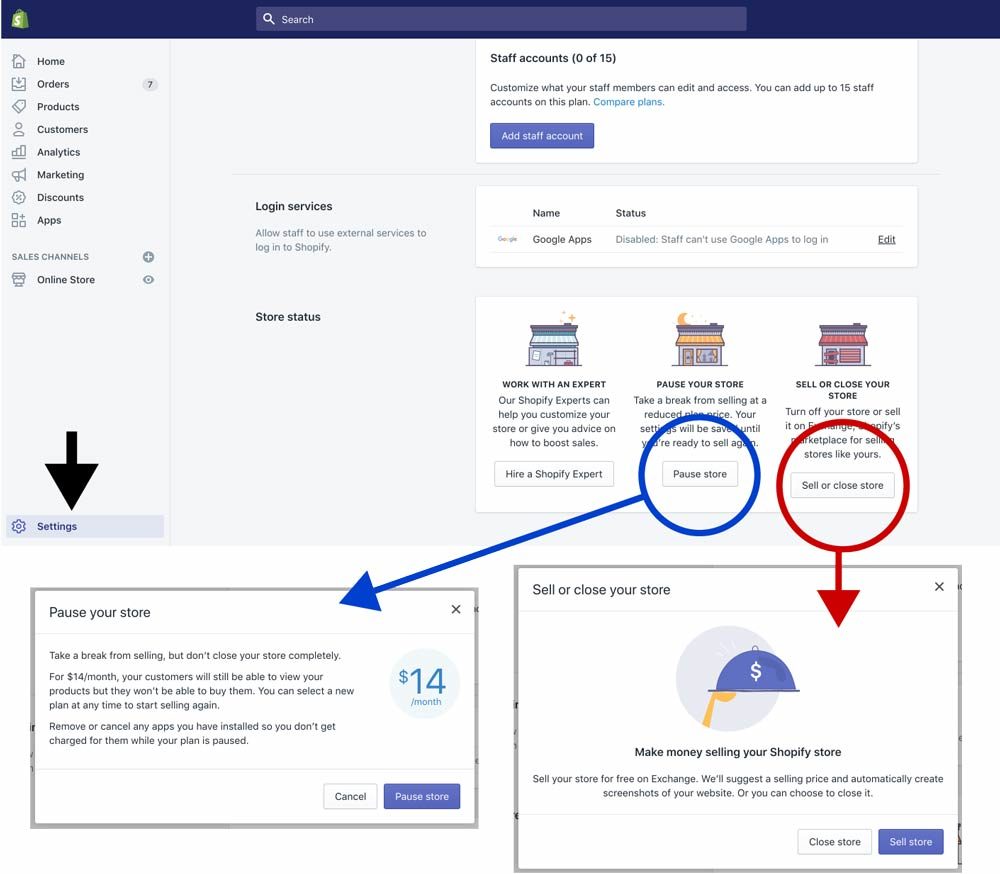What you should know about closing or pausing your Shopify Store
If you are wondering how to cancel Shopify due to one reason or another, you can completely or temporarily close your store by yourself.

However, in both cases, you’ll have to inform any third-party providers about your decision to cancel their services to stop incurring expenses. Sometimes your account may have pending charges, and you want to shut down or pause your store. In such a case, Shopify will send an invoice indicating the fees that need clearance. Let’s understand both ways.

Steps to take when closing or pausing a Shopify account
- Goto Settings > Account > Store status
- Click PAUSE YOUR STORE or SELL OR CLOSE YOUR STORE
Closing your Shopify store
If you no longer desire to run your Shopify online store in the future, there are a few things an account owner needs to understand before the shutdown process. They include the following.
Option to sell the store
If your store has a nice brand or at least some sales, you might want to sell the store to someone else to run it. Shopify helps you to find a buyer on your behalf. This option is always worth considering.
Try a different Website Builder
If you had trouble getting the look, feel and functionality just right with the Shopify theme editor, you can try out LiquidBlox as a simple alternative. You even have an option to use Shopify's $5/month Starter plan in this case.
No refunds
As outlined in their service policy and terms, Shopify doesn’t issue refunds. They do have an option for a free trial with no requirement for a credit card. In that case, you don’t have to worry about charges if you cancel during the trial.
Payment of outstanding charges
It's important to ensure all outstanding charges have been paid off before closing your account to avoid further costs.
Cancellation of third-party applications and add-ons
Uninstall all apps to avoid being billed. There is a possibility that you are in the middle of a payment period of an app subscription. In such a case, you might want to wait until the payment period almost closes before shutting down your store.
Custom domain transfer
Usually, an account owner has connected a third party domain. It is advised removing the connection before closing the account.
Closing or deleting
As soon as you close your store, it will be impossible to contact the admin. Nonetheless, you can still use your credit card information to get back to your account. This should reactivate your Shopify marketplace. Also, deleting your account will block you from using the same online store name in the future.
Migrating to another e-commerce platform
If you are planning to continue selling on another e-commerce platform, you need to migrate all the data from Shopify. In this case you should look at tools like Litextension to automate the process.
Pausing your Shopify store
Instead of entirely closing your account, one has the option of pausing the store for a specific period. The advantage of pausing your Shopify store is that you still get to access your control panel unlike when you close the store.
The owner still pays the charges but half the amount. The store status remains active, but the check-out is deactivated. This means your customers can see the products but they can’t buy them.
Conclusion
If you are planning to close your store, ensure you first get the correct information on how to cancel Shopify. Also, cancel any third-party apps to avoid additional charges. Notice that by uninstalling your online store mobile app won’t automatically cancel any contracts.





















